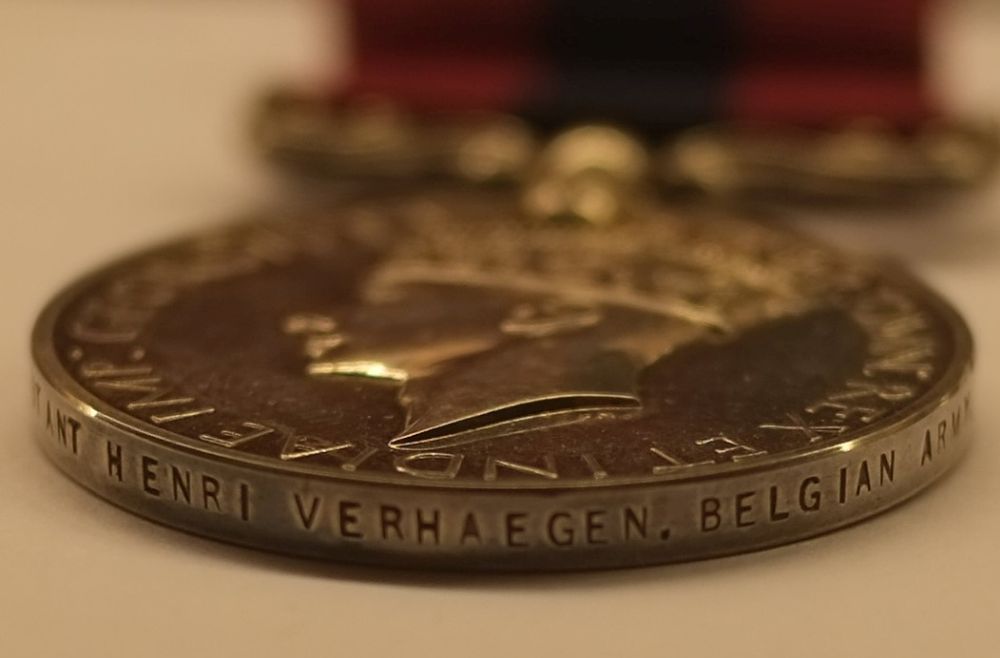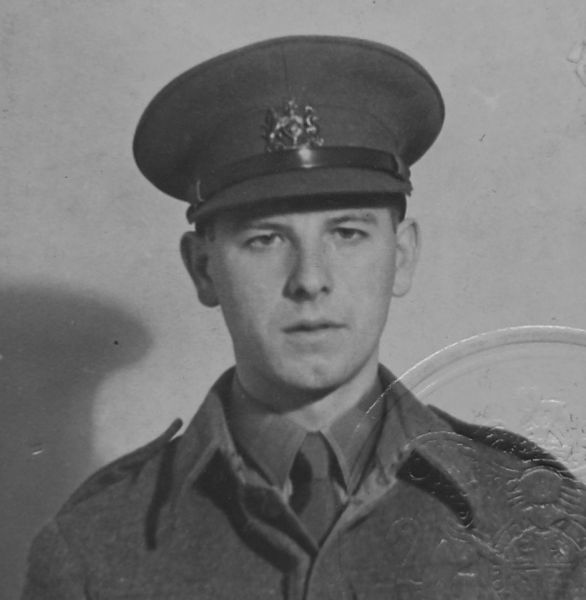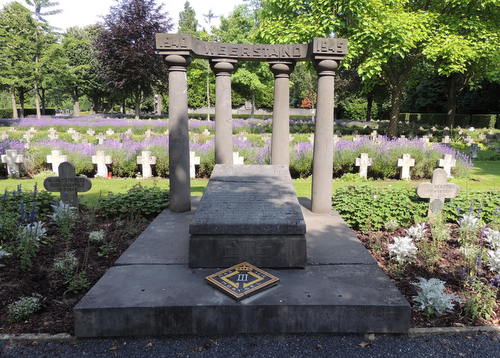Verhaegen, Henri Paul "Rhomboid"
- Date of birth:
- July 28th, 1921 (Waarloos, Belgium)
- Date of death:
- January 8th, 1944 (Tetworth Hill/Bedfordshire, United Kingdom)
- Buried on:
- Memorial and Graves Belgium Resistance
- Service number:
- 244284
- Nationality:
- Belgian
Biography
Captain Henri Verhaegen was killed in a Halifax crash at Tetworth Hill, near RAF Tempsford.

DSM (Source: Dimitri Van Laere)
Do you have more information about this person? Inform us!
- Period:
- Second World War (1939-1945)
- Rank:
- Adjudant
- Unit:
- T Section, Special Operations Executive (SOE), British Government
- Awarded on:
- January 14th, 1943
"After two unsuccessful attempts Adjudant Henri Verhaegen, a Wireless Operator, was landed in Belgium with his organiser early in October, 1941.
While the organiser was active in forming sabotage groups and obtaining a complete documentation on the Légion Belge, Verhaegen aided him in the reception, transport and distribution of explosives and devices, instructing recruits in their use as well as carrying out his primary task of maintaining communications with this country.
Verhaegen lived successively in Liège, Brussels and Louvain besides making numerous journeys to the Ardennes and elsewhere for the purpose of transmitting messages, collecting stores and explosives, reconnoitring landing grounds and making various contacts. Many of these journeys entailed considerable personal risks, he was in contact with, and dependent upon, people whose loyalty or goodwill he had reason to suspect.
The organiser's mission being accomplished towards the end of November plans were made for him to return to this country. The operations failed to materialise on several occasions but finally the two travelled to Neufchâtau and, having inspected the landing ground on arrival, received warning that the operations was to tak place that night.
After dark they proceeded to tha landing ground and were laying out the landing lights when they were challenged and fired on by a detachment of enemy soldiers. The organiser escaped into a wood but Verhaegen tripped and was caught by three German soldiers who removed his revolver, money and documents and brutalised him in order to obtain information regarding his presence and activities there.
On the pretext of showing him the landing lights, Verhaegen succeeded in leading one of his captors away, wrested his rifle from him and shot him with it. He was pursued and fired at by the remainder of the detachment and wounded.
In spite of this he succeeded in contacting the organiser who he had also made good his escape. They then went into hiding in the house of a friend in Grand-Halleux from whence the organiser went on to Brussels where the was arrested a few days later.
Meanwhile Verhaegen had had his wireless brought to him from Brussels and communicated several times with this country and intending to hand over one set to the friend with whom he was staying he instructed the latter in its use. At this stage, worried by the turn of events were taking, he arranged to live elsewhere.
A few days later he again met his friend, just as the latter was escaping after shooting four Germans who had searched his house and had discovered the wireless set. In constant danger of detecting the two travelled to Liege. Verhaegen went into hiding there, once narrowly escaping arrest when he left his hiding place shortly before it was searched. He contacted various organisations and, through them, tried to obtain instructions from this country for his escape from Belgium. For about six weeks he continued to live in Belgium in touch with numerous people and continued his activities in the organising of sabotage.
During the period they had been in Belgium Verhaegen and his organiser were instrumental in causing a considerable amount of damage including in total, damage to seven German planes, a number of German lorries, four transformers, a bullet making machine at the Fabrique Nationale, a tyre depot burnt out and a train derailed, the latter causing the deaths of fortyfive Germans and seriously injuring one hundred seventy-seven. Seven Gestapo Agents and traitors were liquidated.
Towards the end of February, 1942, two months after the misadventure near Neufchâtau he crossed the border into France in company with two other refugees. Through various contacts he made his was through France into Spain as far as Salamanca but there he was arrested and sent to the prison camp of Miranda where he stayed for four months before the British Military Attache succeeded in having him released.
On all these matters and on many activities and individuals in Belgium and elsewhere Verhaegen has reported most clearly and precisely in a manner which belies his youth and commands the unreserved respect of his seniours with considerable experience of such activities. Throughout the whole of the operation Verhaegen displayed a high degree of courage, resourcefulness and devotion to duty.
I strongly recommend that he should be awarded the Military Medal.
Colin Gubbins
Brigadier"
Originally recommended for a Military Medal but upgraded to a DCM.
- Period:
- Second World War (1939-1945)
- Unit:
- T Section, Special Operations Executive (SOE), British Government
- Awarded on:
- April 8th, 1944
"Splendid soldier, inspired with the most glorious patriotic ideal, true hero of secret wireless assignments who died honorably during completing one of these missions.
On April 8, 1944 in that capacity he will take presendence in the Order."
With Palm.
Sources
- Photo 1: Dimitri Van Laere
- Photo 2: Mia van den Berg
- - WO 373 Awards WO 373/184
- SOE Verhaegen, Henri Paul
- Belgisch Staatsblad 9 januari 1946





